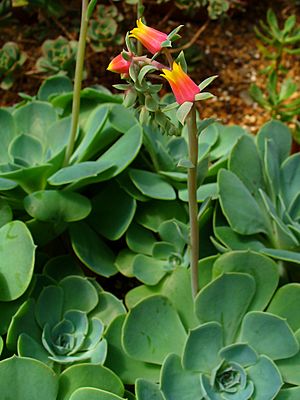Echeveria gibbiflora facts for kids
Quick facts for kids Echeveria gibbiflora |
|
|---|---|
 |
|
| Scientific classification | |
| Genus: |
Echeveria
|
| Species: |
gibbiflora
|
| Synonyms | |
|
|
Echeveria gibbiflora is a cool type of flowering plant. It belongs to the Crassulaceae family, which includes many succulents. A Swiss botanist named Augustin Pyramus de Candolle first described it in 1828. You can find this plant growing naturally in Mexico and Guatemala.
Contents
About Echeveria gibbiflora
Echeveria gibbiflora is a large plant from the Echeveria group. It grows in a shape called a "rosette." This means its leaves are arranged in a circle, like the petals of a rose. Each plant can have about 15 leaves.
Flowers and Seeds
This plant also grows a tall stem that can reach up to 1 meter (about 3 feet) high. This stem holds many flower buds, sometimes as many as 160! The flowers are red and shaped like tubes. They are about 2.5 centimeters (1 inch) long. Each flower has 10 stamens (the parts that make pollen) and 5 styles (parts that receive pollen).
Echeveria gibbiflora usually blooms between September and January. After the flowers fade, they turn into dry fruits. Each fruit can hold around 200 tiny seeds.
Nature's Helpers
The flowers of Echeveria gibbiflora stay open for about 7 to 8 days. During this time, they are visited by broad-billed hummingbirds (Cynanthus latirostris). These hummingbirds love to drink the sweet nectar from the flowers.
Another bird, the American bushtit (Psaltriparus minimus), has been seen around these plants. Bushtits look for tiny insects called aphids that sometimes live among the flowers.
Different Types of Echeveria gibbiflora
People have grown different versions of Echeveria gibbiflora that have special features. These are called "cultivars." Some popular cultivars include:
- E. gibbiflora 'Carunculata' (sometimes spelled 'Caronculata')
- E. gibbiflora 'Metallica'
- E. gibbiflora 'Violescens'
See also
 In Spanish: Oreja de burro para niños
In Spanish: Oreja de burro para niños


